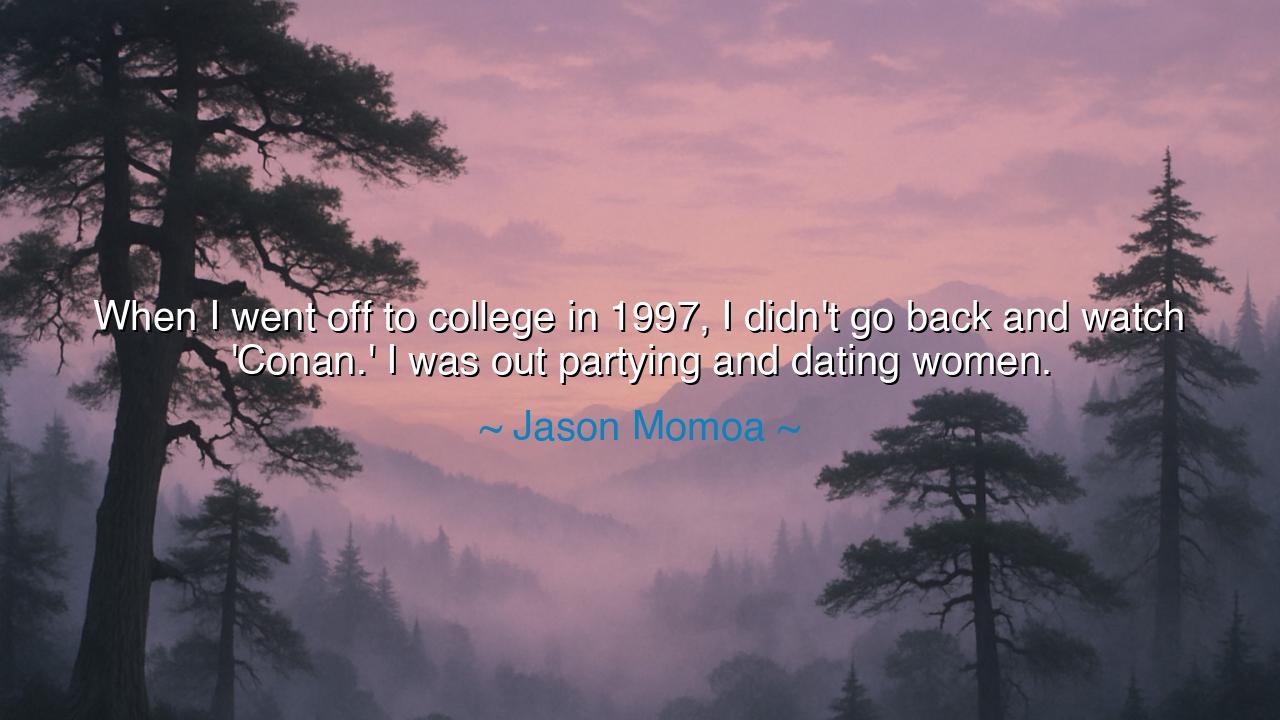
When I went off to college in 1997, I didn't go back and watch
When I went off to college in 1997, I didn't go back and watch 'Conan.' I was out partying and dating women.






In the book of early manhood there is a page that smells of late nights, neon, and unspent promise. On it is written: “When I went off to college in 1997, I didn’t go back and watch ‘Conan.’ I was out partying and dating women.” Hear the voice behind the boast: not mere swagger, but a confession about appetite and the gravitational pull of the present. The young do not study destiny; they dance with it. What Momoa names is the heat of immediacy—the way a new city, open doors, and untied hours drown out the call of distant icons and future roles. In that tide of living, the screen dims and the world becomes the screen.
To say he skipped Conan is to admit that myth did not shepherd him then; experience did. The elders would call this the pedagogy of the street. We learn first with our bodies—how laughter carries, how risk tastes, how a glance opens or closes a night. Partying is the raw liturgy of belonging; dating is the workshop where clumsy courage is hammered into tenderness, or at least into a story one day softened by time. The confession does not scorn art; it simply tells the order of events: life first, then legend.
Yet the irony gleams: the young man who ignored Conan would one day shoulder the sword and stride into that very saga. This is the old law of circles. A river may bend so widely that it forgets its source, and still it finds the sea appointed for it. The ancients said that fate is a patient archer; even when youth looks away, the arrow travels. Thus the origin of the quote is not only biographical—it is archetypal. The future sometimes arrives after we have spent our early light chasing smaller fires.
Consider a story from the chronicles of kings. Shakespeare’s Prince Hal haunted taverns and alleyways, keeping company with laughter and lateness. He turned his face from the stern mirror of crown and counsel. Yet when the hour struck, he shed the smoke of the tavern, shouldered England, and spoke as Henry V with a mouth like a trumpet. The boy who was “out” became the man who stood “up.” In Hal we see the same hinge the quote implies: the road of pleasure curving, at last, toward purpose.
There is wisdom here for those who judge quickly. Youthful noise is not the same as youthful nihilism. The one who spends nights in restless motion is often gathering a lexicon of faces, gestures, and griefs. Later, when called to craft or calling—to wield a pen, a camera, or a sword—he draws upon that rough harvest. The skipped episode of Conan could not teach what a bruised heart or a mended friendship could. Some myths we must live before we can watch.
But let us not baptize every excess. The ancients warned that appetite, ungoverned, becomes a tyrant wearing a lover’s smile. The “protracted summer” of partying can harden into winter if it never yields to discipline. The quote’s strength is its honesty; its warning is between the lines. To mature is not to despise the dance; it is to learn when the drumbeat serves the journey and when it steals the dawn.
Therefore, take counsel fit for apprentices. In college, taste widely—then choose deeply. Let 1997 stand in your mind as a symbol: a year of exploration that must ripen into vocation. Watch your heroes later, with wiser eyes; when you study Conan, study the grit beneath the glamour—the training, the restraint, the code. When out dating, practice honor as if you already wore a crown. When partying, remember the morning you are borrowing from, and leave it enough gold to spend. And when your summons comes—whether to craft, to love, to lead—answer it without apology for the path that brought you, but also without chains to the noise you are outgrowing. Thus do we turn bright corners and find, to our astonishment, that the life we were living has been teaching us how to live all along.






AAdministratorAdministrator
Welcome, honored guests. Please leave a comment, we will respond soon